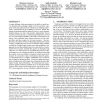Free Online Productivity Tools
i2Speak
i2Symbol
i2OCR
iTex2Img
iWeb2Print
iWeb2Shot
i2Type
iPdf2Split
iPdf2Merge
i2Bopomofo
i2Arabic
i2Style
i2Image
i2PDF
iLatex2Rtf
Sci2ools
ATAL
2009
Springer
2009
Springer
Emergent service provisioning and demand estimation through self-organizing agent communities
A major challenge within open markets is the ability to satisfy service demand with an adequate supply of service providers, especially when such demand may be volatile due to changing requirements, or fluctuations in the availability of services. Ideally, this supply and demand should be balanced; however, when consumer demand changes over time, and providers independently choose which services they provide, a coordination problem known as ‘herding’ can arise bringing instability to the market. This behavior can emerge when consumers share similar preferences for the same providers, and thus compete for the same resources. Likewise, providers which share estimates of fluctuating demand may respond in unison, withdrawing some services to introduce others, and thus oscillate the available supply around some ideal equilibrium. One approach to avoid this unstable behavior is to limit the flow of information between agents, such that they possess an incomplete and subjective view o...
Artificial Intelligence | ATAL 2009 | Consumer Demand Changes | Service Demand | Service Providers |
| Added | 26 May 2010 |
| Updated | 26 May 2010 |
| Type | Conference |
| Year | 2009 |
| Where | ATAL |
| Authors | Mariusz Jacyno, Seth Bullock, Michael Luck, Terry R. Payne |
Comments (0)

